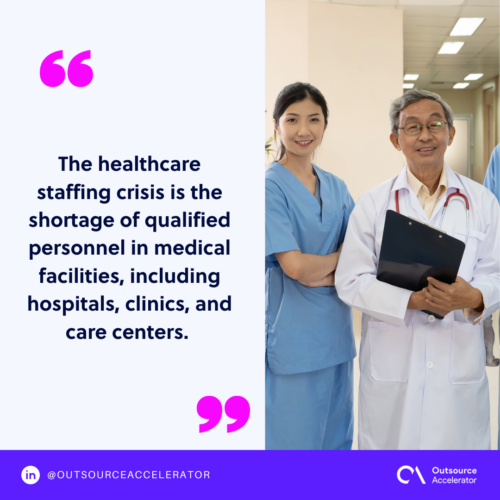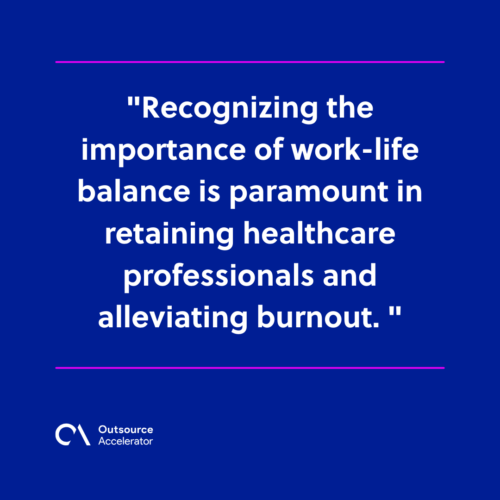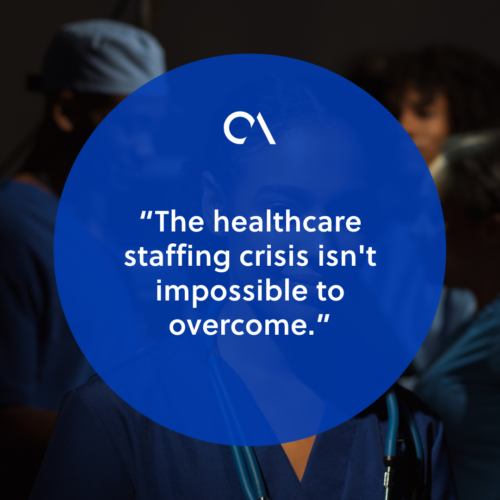How do you navigate the healthcare staffing crisis?

The healthcare industry is currently experiencing a staffing crisis that poses significant challenges to patient care.
According to Time Magazine, the healthcare system in America is experiencing a severe shortage of personnel, significantly impacting the quality of care provided.
Understanding the crisis, its effects on patient outcomes, and implementing effective strategies are crucial for navigating this complex situation.
In the Outsource Accelerator podcast, Select VoiceCom CEO Mark Shapiro shared his insights about the healthcare staffing crisis, specifically in the United States.
What is a healthcare staffing crisis?
The healthcare staffing crisis is the shortage of qualified personnel in medical facilities, including hospitals, clinics, and care centers.
This encompasses various roles, from nurses and physicians to support staff. It creates a substantial gap between supply and demand.

What are the effects of staffing shortages on patient outcomes?
Staffing shortages in healthcare settings can significantly impact patient outcomes in several ways:
Decreased quality of care
One of the most critical consequences of healthcare staffing shortages is a decline in the quality of patient care.
With fewer staff members, healthcare providers may need help to meet the demands of a growing patient population, leading to compromised standards of care.
Increased wait times
Staffing shortages often result in longer wait times for patients seeking medical attention.
Extended wait times inconvenience patients and can worsen health conditions by delaying necessary treatments and interventions.
Higher risk of infections
Insufficient staffing levels can contribute to lapses in infection control protocols, increasing the risk of healthcare-associated infections.
Proper patient care, including hygiene and sanitation practices, becomes challenging when insufficient healthcare professionals are available.
Strategies for mitigating the crisis
To address the healthcare staffing crisis, healthcare organizations can implement various strategies:
Recruitment and retention incentives
Addressing the healthcare staffing crisis requires a multi-faceted approach. One crucial aspect is the implementation of effective recruitment and retention incentives.
Healthcare organizations can attract and retain top talent by offering competitive packages beyond traditional compensation.
Training and development programs
Investing in the continuous training and development of healthcare professionals is essential.
Implementing comprehensive training programs can address skill gaps, improve employee satisfaction, and contribute to a more skilled and adaptable workforce.
Flexible work arrangements
Recognizing the importance of work-life balance is paramount in retaining healthcare professionals and alleviating burnout.
Flexible work arrangements can cater to individual needs and preferences. It promotes a healthier work environment.
Utilizing technology
Embracing technology is crucial for optimizing healthcare processes, improving efficiency, and enhancing patient care.
Technology can fill gaps created by staffing shortages and contribute to overall operational excellence.

How outsourcing can help with the healthcare staffing crisis
In the podcast, Mark shared the continuous shortage of high-quality nurses in the U.S., worsened by the impact of COVID-19.
“There is always a shortage of quality nurses in the U.S. Certainly, COVID didn’t help that. And COVID ramped up the demand, the salaries, and therefore the cost of getting nurses to provide the services.”
We want to let the U.S. nurses focus on what they must do on the ground. They have to meet with the patients and provide the in-person healthcare,” he pointed out.
“What we want to be able to take off their shoulders is all of the back-end paperwork that the nurses then have to do after they meet with the clients and provide the care.
The U.S. system requires this ton of paperwork, and it does require medical knowledge.”
Moreover, the Select VoiceCom CEO talked about the rise of software solutions specifically created to manage this administrative workload: “There’s now a whole software environment where we can handle that work HIPAA-compliantly.
HIPAA is the Health Insurance and Portability Act, which is the health insurance privacy law in the U. S. There are precise ways to manage private health information, and we can use that to handle all of that backend paperwork and relieve the duty of nurses, ” he explained.
He further clarified that it’s not a complete rebuilding of the processes:
“I wouldn’t say it’s a rebuilding. It involves educating about your debt situation, usually by discussing how we can offer these services with a healthcare facility executive [through outsourcing].
Still, they all realize that this paperwork can be done in other places, in different ways, for much less money. Some nurses earn six figures annually, and their time should be spent with patients, not on paperwork, ” he clarified.
“It takes a little time to figure out the process, and we don’t dictate it to our clients. We look at every client, and all aspects involve intake and insurance.
Then there’s the paperwork and the quality assurance aspect to ensure their documents are filled out correctly,” he noted.
Is it possible to overcome the healthcare staffing shortage?
The healthcare staffing crisis isn’t impossible to overcome. It’s like a puzzle waiting for solutions.

We can tackle this challenge by using creative incentives, adopting technology, or changing healthcare policies.
These approaches can help us navigate through these difficult times. Insights from the CEO highlight the problems and the ways to find a robust and lasting solution.
It’s important to remember that behind every hospital door, there’s a story we have the power to change by facing this crisis directly.







 Independent
Independent




